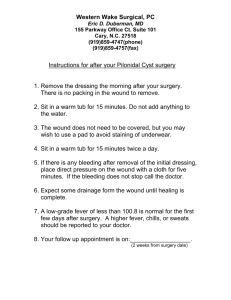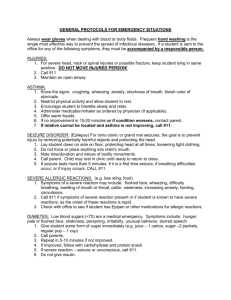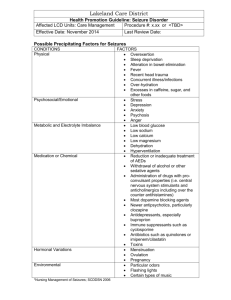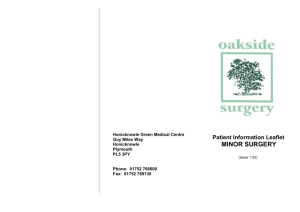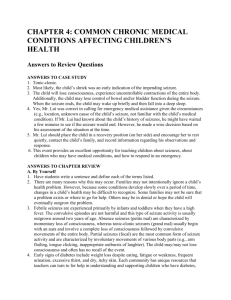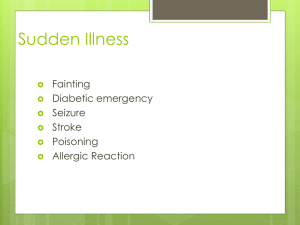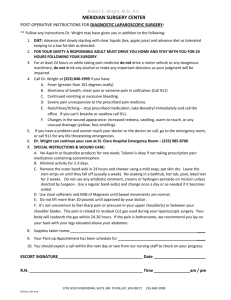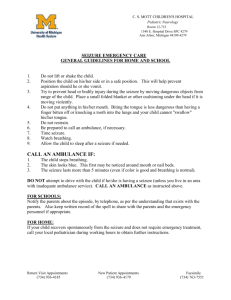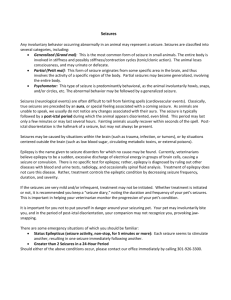Craniotomy - Neurosurgery
advertisement
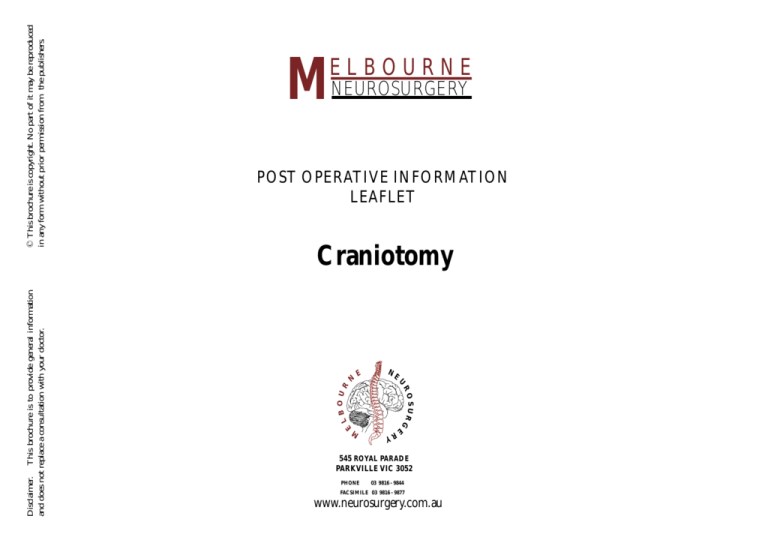
E O U R L B SURG M Disclaimer. This brochure is to provide general information and does not replace a consultation with your doctor. RO PHONE RY E U N E © This brochure is copyright. No part of it may be reproduced in any form without prior permission from the publishers. M ELBOURNE NEUROSURGERY POST OPERATIVE INFORMATION LEAFLET Craniotomy NE 545 ROYAL PARADE PARKVILLE VIC 3052 FACSIMILE 03 9816 - 9877 03 9816 - 9844 www.neurosurgery.com.au It is common to find that your memory is not at its best and that you do not seem to be able to concentrate on any one thing for a long period. If you were someone who reads a lot you may find this difficult. This all gradually improves and affects different people to a varying extent. This inability to concentrate on things can affect your confidence, remember that it does get better ! It is important to have some one to rely on to help in the early recovery period. The first six weeks can be further divided into two week periods. The first two weeks you are just recovering. The next two weeks you are starting regain confidence and are doing more but still getting tired. In the last two weeks thing are getting a lot better and there is light at the end of the tunnel. WHAT IS A CRANIOTOMY ? This is when a piece of bone has been removed from the skull to gain access to the brain. There are lots of different types of procedures that can be done inside the head. Depite there differences they all have similar problems in recovery. From the outside all you will usually see is a suture line with either staples or a nylon suture HOW LONG WILL IT TAKE TO GET OVER A CRANIOTOMY ? This depends on: 1. How sick you were before your surgery 2. If you had any neurological problems either before or after the operation 3. Any complications from either the disease or the surgery. 4. Your age. 5. The affects of any post operative treatments such as radiotherapy on recovery. 6. Other medical conditions. There are lots of different things that effect recovery so it is hard to put an absolute time on it. It is important to remember that the type of person that you are will also have some effect as different people recover at different rates. Allowing that everything is straight forward in your surgery and recovery there is a path that you will follow. It can be divided up into the first six weeks which will take you to your first follow up appointment, the six weeks after that and then the three months following that. THE NEXT THREE MONTHS Most people have gone back to work by this period depending on circumstances. Your return to work is graduated to make sure that you can cope with it. It is important to try and increase your exercise and other tasks in a stepwise fashion rather than trying too much to soon as this may result in a loss of confidence. It can all seem too hard if you try to tackle too much early on. FOLLOW UP APPOINTMENTS ? On discharge from hospital you should have follow up appointments with: NE E RO O U R L B N U RY M 1/2 E E SURG THE FIRST SIX WEEKS This is the time that you will make the fastest recovery. Initially when you leave hospital you may feel as though you will be able to do quite a lot. While you have been in hospital you have been resting and most things are taken care of for you. When you go home you will have more to do and may find that you are very tired. This is normal and it is common to need a rest in the middle of the day. This tiredness gradually improves over time. At the end of the six weeks you should be able to get through the day without it. THE NEXT SIX WEEKS This is the time that you have turned the corner and are looking to return to work and other pursuits. When you return for your post operative visit all of these things will be discussed with you. You will be assessed at this visit and a plan will be put in place as to the next steps of recovery. You may have required some rehabilitation and if so your neurosurgeon will have a report of your progress. Some people are able to get back to doing things quicker than others and this will need to be assessed. Your stamina will be a lot better at this stage. It continues to improve further from here. Your NEUROSURGEON LOCAL DOCTOR ONCOLOGIST RADIATION ONCOLOGIST At about six weeks Within two weeks If required If required DRUGS ? WHAT IS NORMAL TO EXPECT ? You will be on certain drugs on discharge. Some you will need to stay on and others you will be reducing or stopping. It is important to be sure which drugs you will need to continue on and what the doses are. When you see your local doctor make sure you have any repeat scripts. Just because your drugs run out does not mean you should stop these. OVERALL All patients are tired when they get home and need a rest in the middle of the day. It is common to have some headaches and an ache around the wound. The general tiredness can lead you to be a little short tempered and this is nothing to worry about and does improve. If you have had a big operation just having a shower can be enough to make you tired. It is alright to have more than one rest during the day but it is important to be doing some light exercise. COMMON DRUGTYPES Steroid Medication ( e.g. Dexamethasone) This is to reduce any swelling in the brain. If the operation is for tumour and you are having radiation therapy it is reduced slowly to a small dose which continues through the treatment and stops after radiation. In most other craniotomies it is progressively reduced to nothing over a few weeks. A lot of patients who have a craniotomy do not require dexamethasone. [see Dexamethasone Leaflet] Anticonvulsant Therapy These are to stop you having seizures[fits]. The need for this is decided by your Neurosurgeon or Neurologist. If you have not had any seizures then they may not be required. All patients who have seizures are usually on an Anticonvulsant. It is important to know the side effects of your drugs and if any blood levels need to be monitored[See leaflets on Dilantin,Tegretol etc.(common drugs)]. There may be some fluid under the scalp that moves around, this is usually fuller in the morning and reduces as the day goes on. As the days go by this will normally reduce as the scalp heals. THE HEAD CARE OF THE WOUND Different surgeons manage this in different ways. After discharge from hospital we like the wound to be kept dry and covered. If it gets wet dry it and replace the dressing. Keep it covered for 2 days after removal of the sutures. The dressing does not need to be changed more than every 2nd day unless it gets wet or soiled. If the wound looks red or is weeping contact your doctor. REMOVAL OF STITCHES ? NE E RO O U R L B N As the swelling in the scalp subsides there will may be a noticable depression where the surgery was. The thing most obvious can be some small holes (called Burrholes) where we gained access to lift the bone of the skull. Over a very long period of time(many years) the bone flap that was opened may shrink substantially. If the cut was in the region in front of the ear and above the jaw there can be some problems in opening the mouth the normal distance. This can be overcome with some exercises(see Exercises section). This occurs because the muscle to the jaw (temporalis) has been cut. U RY M 3[4] E E SURG Some patient have nylon stitches and others have metal staples. Your surgeon decides when they should be removed and this is normally at about day 5-7 post operatively if you have not had a re-operation and at about day 10-14 if you have had a re-operation or previous radiation treatment. These may be removed by the surgeon, the ward or your local doctor or nurse. If you have staples it is important to take a staple remover with you from hospital. THE WOUND This sore for about 5 days . Because there are some nerves cut at the time of the incision there is usually a patch of numbness adjacent to it(usually behind) that will take months to improve, as they grow back there is an occaisional shooting pain around the wound. It will start to itch when it is healing. Some people are able to feel the fluid around the brain move in the first few weeks. This is just the brain readjusting to its normal position it settles fairly quickly and is nothing to worry about. There can be swelling/puffiness/bruising around the eyes. This settles. HEADACHES SEIZURES These are variable. Some people have very little while others are troubled by them. As a general rule they are not troublesome and respond to panadol or panadiene. These can occur to any-one who has had a craniotomy. The risk of having a seizure depends partly on the reason for the procedure and also the type of operation that you have had. Some patients are on anti-convulsant medication prior to the surgery. We may start you on medication during the operation. The minimum time for anticonvulsants is between 3 and 12 months. They can be worse towards the end of the day and they may be linked to increasing tiredness. If we believe the risk of seizures is very low we will discuss this with you preoperatively and may not use an anti-convulsant drug because these can have very severe side effects. Also once starting medication it can be hard to get you off them. Once you have a seizure you will require medication It is imortant to keep your fluids up in warm weather as dehydration may make the headache worse. By 2 weeks post operatively the headaches have mostly resolved depending on the reason for the craniotomy. In some conditions they may last for a few months. Posture can have some effect. If you bring your head up from lying down very quickly then you may get not only a headache but also some dizziness. Placing your head between your knees will increase the pressure in the head and cause increased pain. This may also increase any fluid beneath the scalp. The greatest risk of seizure is early after the operation. This is the time that you are at greatest risk of injury. If you do have a seizure it is important for any-one with you to move anything out of the way that you may bump into and to call an ambulance. Patients and there relatives who know what a typical seizure pattern for them is will not always call the ambulance. If you are very concerned about the risk of seizure you can be discharged with some valium suppositories that can be given to help stop the seizure while waiting for the ambulance. NEUROLOGICAL DEFICIT This is any problem that you have such as weakness, clumsiness, problems with speech etc. If you are taking medicine for seizures you must not stop it abruptly. The ability for this to get better depends partly on the surgery that you have had. It is important to discuss this with your neurosurgeon prior to discharge. NE E RY M 5/6 E E SURG Any recovery can be quick initially then progressively slows, it may continue at a very slow rate for years. RO O U R L B N U As a general rule all deficits will improve to some extent. It depends on whether the underlying brain has been damaged by the disease or pushed out of the way. In patient with significant problems preoperatively it may take longer to recover. The extent of recovery can be unpredictable . There are different types of seizure. The commonest to affect patients post-craniotomy is the type where you become unconscious and convulse. These usually stop after a few minutes. We get you to call the ambulance initially just in case the seizure is prolonged. The next commonest is the type where one of your limbs twitches or jerks but you do not lose consciousness. This may progress to the above type, if it does it is usually fairly quickly. This is a type of seizure that you will reqiure treatment for. ALCOHOL ? HAIR management You can wash your hair 2 days after removal of sutures It may be coloured after 4 weeks post-operatively It is best to avoid this in the early postoperative period but half a glass of wine or a light beer per day is unlikely to cause any problems. Alcohol can affect the metabolism of some anti-convulsant drugs and make them less effective and this may increase your risk of seizures. DRIVING ? You should not drive until told that you can do so by your Neursurgeon. Check it will not interfere with any other medications that you taking. This is usually after Three Months. If you have any doubts discuss with your Neurosurgeon or local doctor. The reasons for this are that you have reduced concentration, you may have a neurological deficit and are at the risk of and epileptic seizure. SPORT / EXERCISE Added to this it is against the law in most states . In the early stages exercise can cause increase in headaches. In most cases if you are driving without permission or against advice and you do have an accident your insurer will not cover you. Tiredness and over exertion may increase the risk of seizure. We suggest the avoidence of all contact sports for at least 12 months after surgery to avoid blows to the head. When you do return to driving we initially suggest: Do not drive at night. Short trips. Have some one with you. Stay out of peak hour. Strick to familiar routes. After 3 months you can start to play non competetive non contact sports starting slowly. Depending on your recovery golf and bowls may be played at 6 weeks. Do not play golf alone in this period. You must consider the risk of seizure and so we advise you not to place yourself in risky situations for the first three months and this means you must not climb onto a chair or ladder. AIR TRAVEL Check with your neurosurgeon. Swimming poses a similar risk, avoid the beach and if in a pool it should be water shallow enough that some-one who is with you can support your head above water if you should fit. Do not swim alone. O U R L B RO RY 7/8 In most cases this is alright unless you have raised intracranial pressure. Some airlines may require a letter from your doctor. If you have titanium plates in your head they do not trigger the metal detector. E E SURG M Walking is good for your general recovery. Do what is comfortable and try not to tire yourself to much. U N NE E In the early stages we would recommend against overseas trips. PHYSIOTHERAPY/EXERCISES WHAT IS IMPORTANT TO NOTIFY MY DOCTOR ABOUT ? You may need physiotherapy for any neurological deficit. This may mean inpatient admission to a rehabilitation centre. Once you are at the point where you can manage at home you will be discharged. You will have some exercises to do and may need outpatient physiotherapy. Wound Increased Redness Discharge Increased fluid below/swelling Fluid Leakage Headaches Increasing Severity Increased Drowsiness Weakness Confusion Speech difficulty Falls Visual Disturbance Seizures / Fitting Nausea / Vomiting Rash Pain or swelling in leg/calf Fever/sweats/neck stiffnes/light intolerance Chest pain or shortness of breath The main exercise we reccomend is walking. This should start slowly with a distance that you are comfortable with and then increased in small increments. Avoid any heavy lifting. Do not be concerned if the first walk tires you out. You may have been given some exercises on discharge from the acute hospital and it is important to continue these. If you have had the incision that cuts your temporalis muscle you may have some difficulty completely opening you mouth. This can be remedied by slowly stretching your mouth open and closed for a period of 5 minutes three times a day. RETURN TO WORK Discuss this with your Neurosurgeon You will normally need at least 6 weeks completely off work. After this you may be able to go back on reduced hours doing the equivalent of light duties. The return to work will depend on your recovery and is usually discussed at your first post op visit. When you do go back to work you cannot operate machinery till at least 3 months post surgery. If you have a neurological deficit this will not stop you returning to work but you may need retraining. E O U R L B RO RY 9/10 E E SURG M Remember that even if you can return part time after 6 weeks you will not be able to drive until 3 months. Some problems are urgent and require immediate treatment, this will mean presenting to the nearest emergncey department. For others you need to contact your local doctor. Your Neurosurgeon is usually available most of the time and NE can be contacted by any emergency department or your local doctor. During the day we can be contacted through the main office and after hours by pager for emergncies. If you see your local doctor he will contact us if he has any concerns. For general questions our practice nurses are able to help in most cases. If they are unsure they will contact your neurosurgeon. U N IF I HAVE A PROBLEM WHOM SHOULD I CALL ?
